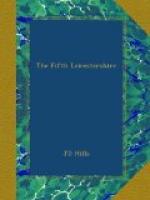On the 5th of March we marched through Lillers and Bethune again to Beuvry and, after staying one night there, moved the following day to Annequin and Sailly Labourse, where we were responsible for the defence of the Annequin locality. The 1st Corps scheme of defence was a series of fortified localities, Philosophe, Cambrin, Annequin, Noyelles, and many others further West as far as Vaudricourt. Each locality had its trenches, dug-outs, stores of ammunition and rations, and was ready for defence at any moment. The German offensive was expected to start any day, and the “wind” was terribly “up.” This, however, did not prevent the Infantry from amusing themselves whenever possible, and though the higher authorities may have been sleeping in their boots, we managed to get some football. General Rowley gave a cup for a Brigade Company Competition, and, while at Sailly, our “A” Company beat Brigade Headquarters in the “final,” after which “Tinker” Evans, the captain of the team, received the cup from the Brigadier.
The following morning we went once more to the line, back into the familiar Cambrin right sector. Unfortunately there was now a change. The Engineers, in an endeavour to make Headquarters less elegant and more shell-proof, had thrown up so much white chalk, that they had attracted the attention of the German artillery, who had promptly shelled the place out of existence. The Headquarters now lived in the old left Headquarters under Railway Alley. We had only two Companies in the line, one in support, and one in Reserve near the Factory; we were thus organized “in depth” to meet the coming offensive.
The enemy’s artillery had certainly become more active during our two months’ absence, and he was now using far more gas shells than before. These were of three sorts: “Green Cross,” the most deadly, was filled with phosgene; “Blue Cross,” the least harmful, with arsenic; both these were very light gases and soon blew away. Far more dangerous were the “Yellow Cross,” mustard shells, which now made their appearance in ever increasing numbers. The mustard hung round the shell holes and was not blown away; in cold weather it had no effect, but as soon as the sun came out it became exceedingly powerful. A mustard shell falling on frozen snow might have no effect until the thaw came several weeks later, when it would be just as powerful as if it had only just been fired. A very little of this gas was sufficient to cause temporary blindness and loss of voice, burns and bad blisters. Much of it was fatal. During this tour, however, we did not suffer any casualties, and nothing of any importance occurred until our last morning before relief, the 16th of March.
At about 1-0 a.m. on this morning, Privates Culpeck and Johnson were sentries together at one of “D” Company’s Lewis gun posts. Hearing a noise in the wire, one of them challenged, and, receiving no answer, fired his Lewis gun. Two minutes later, two Boche, one an unwounded warrant officer, the other a wounded soldier, were being escorted down Railway Alley to Headquarters. Neither of the two prisoners would say much, but what they did say still further confirmed the opinion of the Staff that the attack was soon coming.




